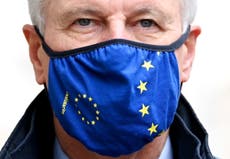Weekly shop will become ‘much more expensive’ in event of a no-deal Brexit, ministers warned
Households will be particularly hard hit at start of next year and into spring
Your support helps us to tell the story
From reproductive rights to climate change to Big Tech, The Independent is on the ground when the story is developing. Whether it's investigating the financials of Elon Musk's pro-Trump PAC or producing our latest documentary, 'The A Word', which shines a light on the American women fighting for reproductive rights, we know how important it is to parse out the facts from the messaging.
At such a critical moment in US history, we need reporters on the ground. Your donation allows us to keep sending journalists to speak to both sides of the story.
The Independent is trusted by Americans across the entire political spectrum. And unlike many other quality news outlets, we choose not to lock Americans out of our reporting and analysis with paywalls. We believe quality journalism should be available to everyone, paid for by those who can afford it.
Your support makes all the difference.The average weekly shop will become "much more expensive" as import costs for everyday items rise by as much as a third in the event of a no-deal Brexit, a major business group has warned.
Households will be particularly hard hit at the start of next year and into the spring.
The UK will be left without a future trade deal with the EU at the end of December, unless one can be struck in the next few weeks.
Businesses have already been told to prepare for a no-deal Brexit.
David Wells, chief executive of Logistics UK, previously known as the Freight Transport Association, urged ministers to intensify efforts towards an agreement as he warned of steep price rises ahead.
Potential hurdles include restrictions on the number of lorry access permits available to enter the EU, he said.
In a letter to The Sunday Times newspaper, he warned: "Everyday household items we import will become more expensive under World Trade Organisation tariffs, some by 30 per cent or more.
"This will make the household shopping basket much more expensive, particularly in the early part of 2021 when we rely on imports for much of our fresh food."
Cabinet minister Michael Gove has admitted that leaving the transition period without a trade deal would cause "some turbulence".
In his letter, Mr Wells said: "The actual cost of moving goods will also increase, if new vehicles, parts and tyres are also subject to tariffs.
"This is more than 'turbulence', as suggested by Mr Gove last week, and logistics businesses, operating on 2 per cent margins, cannot afford to take on these costs."
On concerns around permits to allow lorries to access the EU market, he added that the UK’s quota would fall short “by a factor of four”.
That fact alone would put businesses at risk “right across the country”, he said.
"We are urging government to keep pressing for a deal with Brussels, to protect not only our industry but the economy as a whole."
Subscribe to Independent Premium to bookmark this article
Want to bookmark your favourite articles and stories to read or reference later? Start your Independent Premium subscription today.




Join our commenting forum
Join thought-provoking conversations, follow other Independent readers and see their replies
Comments